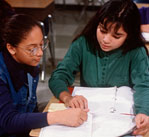 |
|
 |

More Than Homework: Building Study Skills Many expanded learning programs include time for students to complete homework after school. To achieve academic success, however, students don’t just need time to complete homework. They also need to develop study skills that will help them succeed. Tutoring, Mentoring, and Building Study Skills is one of the promising practices in the homework section of the Afterschool Training Toolkit, and it outlines ways you can help students acquire study skills. The first step in successful tutoring and mentoring programs is to identify the subjects in which students need help. For example, if students have ongoing questions about homework in a particular subject area, they may need tutoring in that subject. Consider whether one-on-one or small-group tutoring would be more appropriate. Next, determine the best tutoring match: Is the ideal tutor an afterschool instructor, a teacher, or another student? To help students develop study skills, remember the three Ms essential to mentoring students to succeed in homework: motivation, monitoring, and modeling. To increase motivation, create an open and positive atmosphere, help students feel valued, and give frequent and positive feedback and praise. Monitor students by circulating around the room looking for verbal and nonverbal cues for attention. When helping students who need attention, ask open-ended questions and give students time to think before answering questions. Modeling positive behavior is also important for student success. Always be positive when helping students with homework. To complete their homework, students may need certain skills that are not taught in the school curriculum. For example, students may need help developing supplemental skills such as time management, note-taking, and test preparation. You can
|
The SEDL National Center for Quality Afterschool helps state education agencies and local practitioners develop high-quality programs for academic enrichment as well as youth development activities. |

| 
VIRTUAL ACADEMY FOR AFTERSCHOOL This interactive professional development resource includes five online courses for professionals in a variety of expanded learning settings. Each course includes links to help align afterschool to school-day learning, effective instructional strategies, guided practice in project planning, and evidence-based instruction models that keep students engaged.
|

|
ECHO Charter School 21st Century Program
|
 |
 |
 |
||||||
Give Them a Break |
|
|||||||
This e-mail was sent by: Editor: Laura Shankland
|
You are welcome to reproduce issues of AfterWords and distribute copies at no cost to recipients. Please credit SEDL as publisher. Link to PDF versions of AfterWords is available here. For additional uses, please fill out and submit a copyright request form. Copyright © 2009 by SEDL. |


